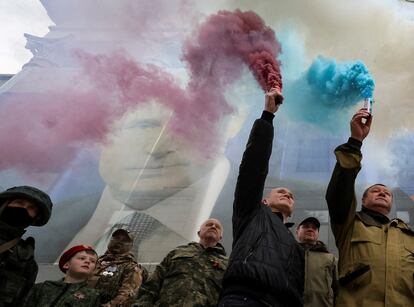Russia to award pilots involved in US drone incident
The announcement appears to signal Moscow’s intention to adopt a more aggressive stance toward future American surveillance flights

Russian fighter pilots involved in an incident with a U.S. drone that resulted in its crash will be given state awards, the Defense Ministry announced Friday. The move appears to signal Moscow’s intention to adopt a more aggressive stance toward future U.S. surveillance flights.
The U.S. military said it ditched the Air Force MQ-9 Reaper in the Black Sea on Tuesday after a pair of Russian fighter jets dumped fuel on the surveillance drone and then one of them struck its propeller while it was flying in international airspace. Moscow has denied that its warplanes hit the drone, alleging that it crashed while making a sharp maneuver. It said that its aircraft reacted to a violation of a no-flight zone Russia has established in the area near Crimea amid the fighting in Ukraine.
On Friday, Defense Minister Sergei Shoigu lauded the pilots for preventing the drone from flying into the area that Moscow has banned for flights. The Defense Ministry emphasized that the ban was “in line with international norms.”
Moscow’s announcement comes a day after the U.S. military released a declassified 42-second color footage showing a Russian Su-27 fighter jet approaching the back of the U.S. drone and releasing fuel as it passes in what appeared to be aimed at blinding the drone’s optical instruments to drive it from the area.
On a second approach, either the same jet or another Russian Su-27 that had been shadowing the MQ-9 struck the drone’s propeller, damaging a blade, according to the U.S. military, which said it then ditched the aircraft in the sea. The video excerpt does not show the collision, although it does show the damage to the propeller.
The top U.S. and Russian defense and military leaders spoke Wednesday about the destruction of the drone in the first calls between them since October, underscoring the event’s seriousness.
While calling out Russia for “reckless” action, the White House also tried to avoid exacerbating tensions. U.S. officials emphasized that they have not been able to determine whether the Russian pilot intentionally struck the American drone and stressed that lines of communication with Moscow remain open.
Russian officials also emphasized the need to maintain lines of communication, but they harshly denounced the U.S. action as arrogant disregard of Moscow’s no-flight zone.
Dmitry Medvedev, deputy head of Russia’s Security Council chaired by President Vladimir Putin, said Friday that, “simply put, the Americans have become far too gross, and we shouldn’t be too polite with them.” He added on a more cautious note that “of course, contacts between the military are necessary.”
Pro-Kremlin political analyst Sergei Markov pointed at the award for the pilots who buzzed the U.S. drone as “a clear sign that Russia will keep downing the American drones.”
“This decision will receive a strong support from the Russian society that wants the government to toughen its policy,” Markov wrote in a commentary.
Moscow has repeatedly voiced concern about U.S. intelligence flights close to Crimea, which Russia seized from Ukraine in 2014 amid strong international condemnation. The Kremlin has charged the U.S. and its allies of effectively becoming engaged in the conflict by providing weapons and sharing intelligence with Kyiv.
Some Russian officials charged that the U.S. surveillance flights helped gather intelligence that allowed Ukraine to strike Russian targets.
Sign up for our weekly newsletter to get more English-language news coverage from EL PAÍS USA Edition
Tu suscripción se está usando en otro dispositivo
¿Quieres añadir otro usuario a tu suscripción?
Si continúas leyendo en este dispositivo, no se podrá leer en el otro.
FlechaTu suscripción se está usando en otro dispositivo y solo puedes acceder a EL PAÍS desde un dispositivo a la vez.
Si quieres compartir tu cuenta, cambia tu suscripción a la modalidad Premium, así podrás añadir otro usuario. Cada uno accederá con su propia cuenta de email, lo que os permitirá personalizar vuestra experiencia en EL PAÍS.
¿Tienes una suscripción de empresa? Accede aquí para contratar más cuentas.
En el caso de no saber quién está usando tu cuenta, te recomendamos cambiar tu contraseña aquí.
Si decides continuar compartiendo tu cuenta, este mensaje se mostrará en tu dispositivo y en el de la otra persona que está usando tu cuenta de forma indefinida, afectando a tu experiencia de lectura. Puedes consultar aquí los términos y condiciones de la suscripción digital.








































